'If you were to say today that the government should appoint judges to the high courts and Supreme Court, then I think that even those few good judges that we are getting today we would not get them.'
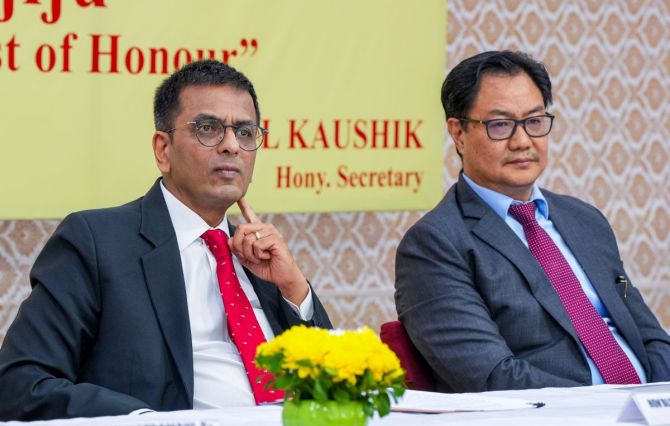
As the Executive branch of the Indian State takes on the Judiciary over how judges to the high courts and Supreme Court are appointed, a section of the legal fraternity believes the judiciary must show spine while dealing with the executive
"Very few countries in the world have a Constitutional oath for judges... Our Constitutional framers provided the oath because they wanted them to stick to the oath. The oath says I will decide independently, without being influenced by any ill will or favour or any anything else. You must live up to that oath once you take that oath. If you don't live up to that, then I think you have failed the office that you were appointed to," Senior Supreme Court Advocate Dushyant Dave tells Prasanna D Zore/Rediff.com.
Part I of the Dushyant Dave Interview: 'Judges are not free of fear'
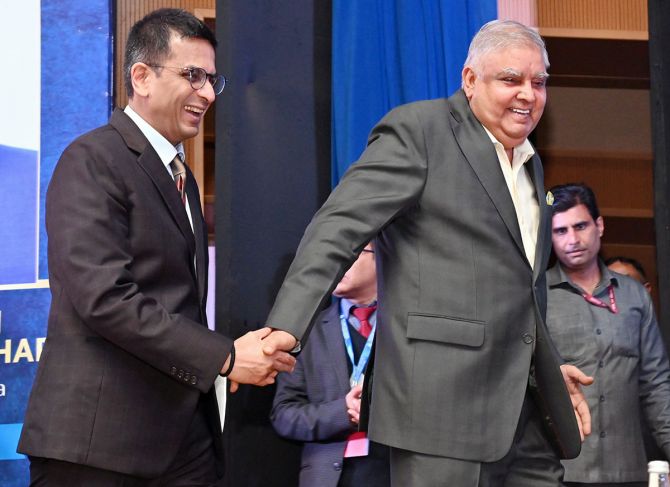
How do you see the comments made by Law Minister Rijiju and Vice President Jagdeep Dhankar criticising the way judges are appointed to the high courts and the Supreme Court by the Supreme Court Collegium and the backlog of cases?
I must say that the Collegium system is not perfect. I have spoken and written extensively against the Collegium system. I personally feel that the Collegium system has appointed far too many poorer judges than the Executive did prior to 1992.
I have been at the (the Supreme Court) Bar since 1978 and I have seen judges since then. I think the quality of judges has deteriorated much more since 1992 (the Collegium system of appointing judges began in 1993) and the allegations of corruption have increased immensely since then.
Prior to 1992 hardly any judge could be accused of being corrupt, and nobody would even talk in whispers in the corridors of the court that a particular judge is corrupt.
Today, if you hear the gossip in the corridor of courts across the country and go to lawyers' canteens you will hear large scale discussions taking about (the integrity of) many judges.
There are outstanding judges; there are fiercely independent judges that we have, but there are some rotten apples among the golden apples. That is something what the Collegium, according to me, is responsible for.
I have seen one thing in the last seven years that whatever the worth the Collegium has, whatever may be the reason, the Executive has been very strongly influencing the Chief Justices of India.
Since (the appointments of Chief) Justice Deepak Misra, Justice (Jagdish Singh) Khehar, Justice (Ranjan) Gogoi, Justice (Sharad Arvind) Bobde took place as the Chief Justice of India, (the Supreme Court) Collegium, even those comprising of good judges like Justice Madan Lokur, Justice (Jasti) Chelmeshwar, Justice Kurien Joseph, they also capitulated and were responsible for agreeing to not appoint good judges to the Supreme Court or good lawyers to the high courts; in agreeing to transfer good judges like Justice Akil Qureshi, Justice Jayant Patel from Gujarat. They were squarely responsible; they failed us.
Many people who should not have been considered for high court judgeship were considered and appointed and some of them have very strong ideology as that of the ruling party (the BJP). This is a matter of great concern. The Collegium system has not been perfect.
But having said that, I must say if you were to say today that the government should appoint the judges to the high courts and Supreme Court, then I think that even those few good judges that we are getting today we would not get them.
The government will end up appointing the kind of appointments that this government makes in many Constitutional bodies like the Election Commission, the Comptroller and Auditor General, or other Constitutional bodies including positions like the (governor of) the Reserve Bank of India or central investigating agencies, where they only appoint their chosen people. The whole process appointments of government today, if you see across the board, barring a few exceptions, is extremely selective.
Now, if that selective process were to creep in and the Executive were to start appointing (judges), then we will have a very serious challenge because the last hope that citizens could have would have also been extinguished.
How long we could continue to have that hope is also a big question mark. The Judiciary is indeed the nation's last hope.
Why would you say that the Executive had a free run during the tenure of some of the previous chief justices?
Justice (Uday Umesh) Lalit (the Chief Justice who was succeeded by incumbent Chief Justice Dhananjay Yashwant Chandrachud) was outstanding. He couldn't be influenced by the Executive. He showed lot of independence. Many of his orders were not like to the liking of this government.
He did issue bail to the activist Teesta Setalvad while her plea was being considered by the (Gujarat) high court. Even (Chief) Justice (N V) Ramana, for example, did stand up against the government in cases like the (Union) Minister (of state for home Ajay) Mishra's son (Ashish Mishra), who was accused of running over five innocent people (in UP's Lakhimpur Kheri during the farmers' agitation against the three agriculture laws) and also while protecting the citizens whose houses were being bulldozed in Jehangirpuri in Delhi. He did show courage.
I would say some of these chief justices, for some reason or the other, despite there being no reason turned out to be extremely weak, they definitely were party to orders and judgments, which are seriously questionable.
The entire power that they have as the Master of the Roster, they really used it to convenience the Executive in power today and to the detriment of democracy and democratic values. There's is no doubt about that.
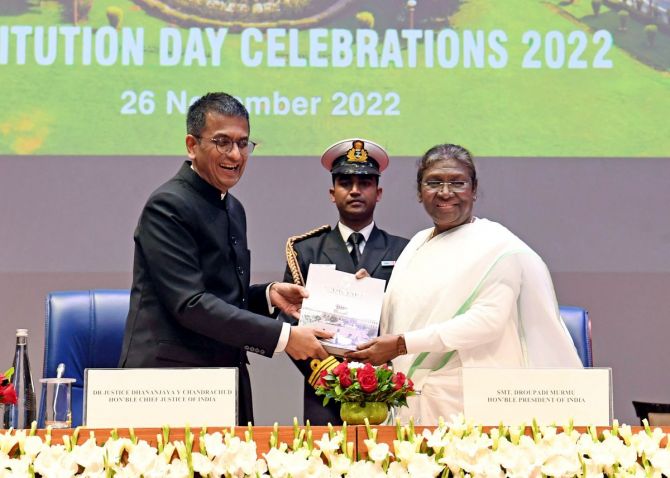
How do you look at Chief Justice D Y Chandrachud?
He is a very fine judge, is a great visionary and is extraordinarily brilliant.
One way I would judge him is by how he (handles his responsibility as) Master of the Roster.
As Master of the Roster, he has to ensure that the constitution of benches is fair, fiercely independent and assignment of cases is done on an absolutely objective basis.
If he fails in this duty, then in my opinion he would have failed miserably. In that case, all his brilliance, vision and hard work will be eclipsed by his failure to control his registry and his powers as the Chief Justice of the Supreme Court.
The same thing is happening with the high courts' registry where you can see a lot of Opposition leaders in jail today. And these are the cases where they should have been granted bail for the asking. But these (high court) judges are not willing to grant bail to them.
All kinds of investigations are going on (against Opposition leaders), which are completely uncalled for; nobody close to the ruling party is even being allowed to be investigated, much less actually investigated as if they are the only angels in this country.
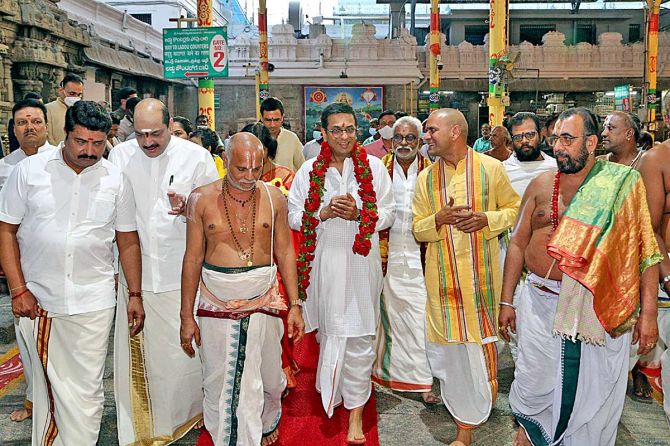
The Judiciary has to really step up its vigil much more than what it has. Chief Justice Chandrachud has made some very strong statements while on and off the bench, which gives us hope that perhaps the Judiciary under his leadership will be able to stand up for civil liberties, to protect Fundamental Rights, to protect the Constitution in letter and spirit, and to ensure that justice is done in the right way.
Very few countries in the world have a Constitutional oath for the judges, or Members of Parliament or ministers. Our Constitutional framers provided the oath because they wanted them to stick to the oath. The oath says I will decide independently, without being influenced by any ill will or favour or any anything else.
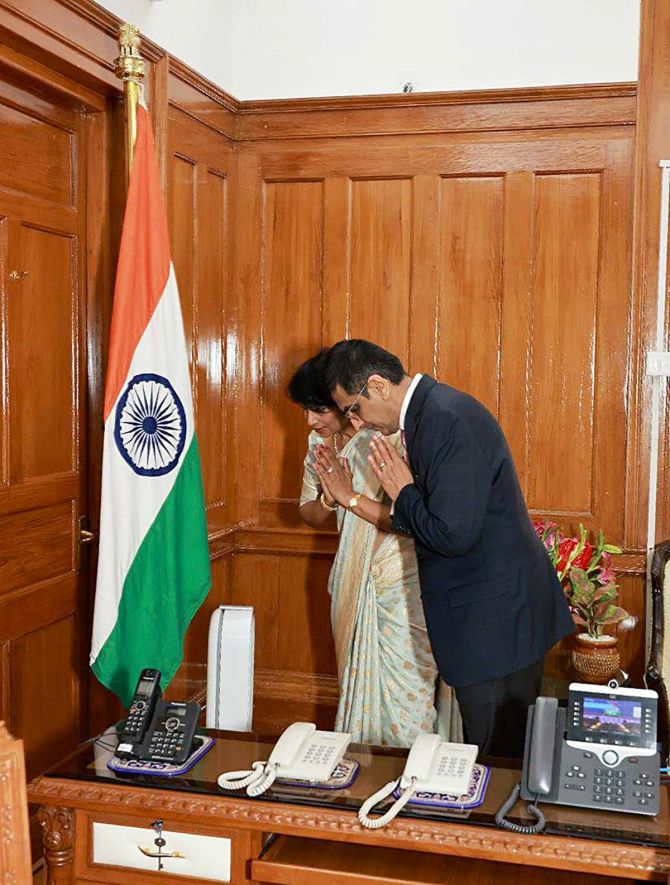
You must live up to that oath once you take that oath. If you don't live up to that, then I think you have failed the office that you were appointed to. These are very high offices; some of the greatest office in a democracy.
But today we are seeing some serious erosion in Constitutional values, in Constitutional morality. It is as if the Constitution only exists on paper.
We must all sincerely endeavour to allow our Constitution to function in the letter and spirit as the Constitutional framers had envisaged. They didn't want a weak nation. They wanted a very strong democracy; a real democracy.










